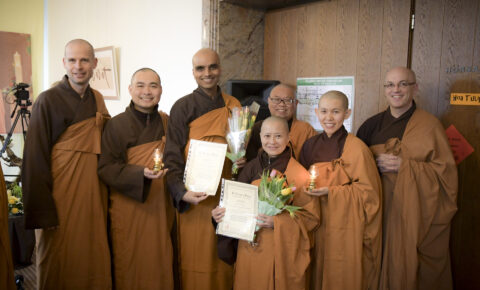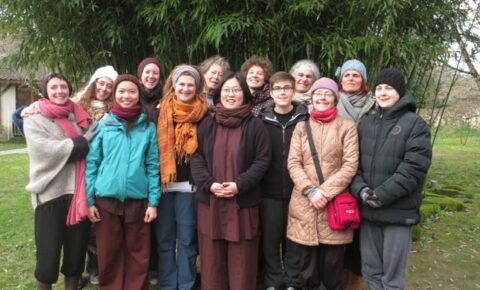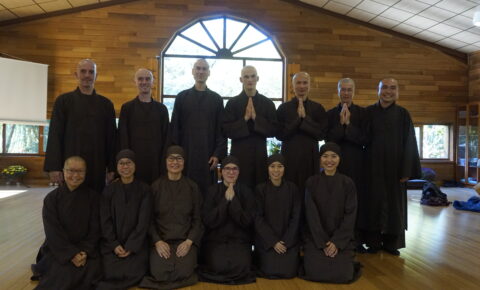In this article we explore the transformative art of deep listening while door knocking in the lead up to the US election from Annie Mahon, an engaged practitioner and Dharma teacher in The Plum Village Tradition.
In early October, I was in planning mode for a one-month trip to Plum Village to soak up the teachings and energies of the Rains Retreat, when I started feeling discouraged about the divisiveness in the U.S. and fearful about the upcoming presidential election between Kamala Harris and Donald Trump. Over the weeks leading up to my departure, my heart let me know that I needed to get involved in the election in a more serious way before I left.
I had not gone door to door since working on my Dad’s county commissioner campaign in 1981. My parents were both political activists and their care for the community and belief in the democratic process gave me the courage to get involved. I knew that my home state of Michigan and in fact my home county, Macomb, was what they call a “battleground” area because it was a county that could decide the election for Michigan and Michigan was one of the states that could decide the election for the whole country.
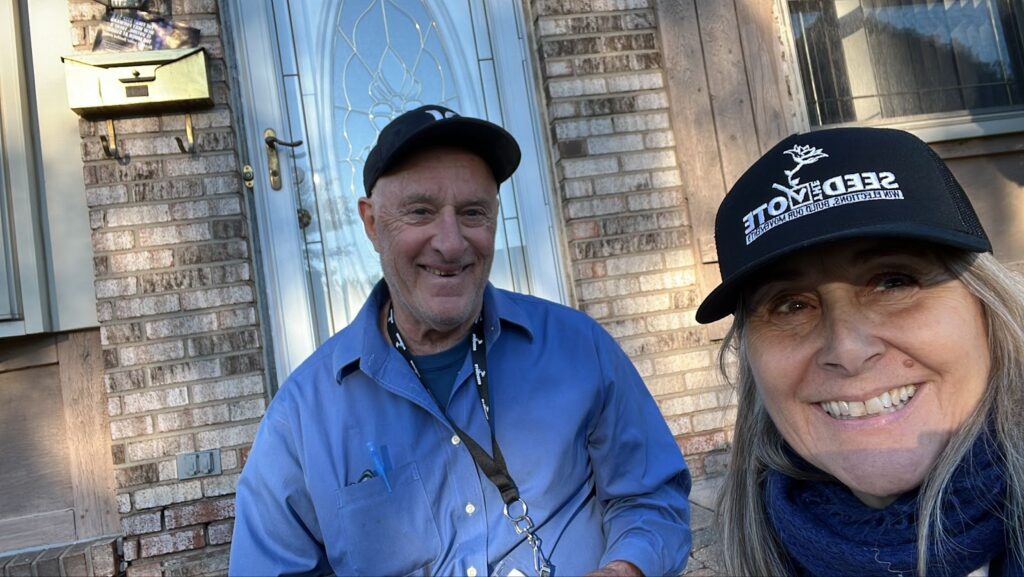
Listening just to listen
Full of uncertainty about my competence, I signed myself up to go door to door with a group of folks for eight days of what is called “Deep Canvassing” in Macomb county. What I discovered was that my mindfulness practice was not only applicable to what we did, but felt truly necessary for talking to a wide variety of folks on their front porches. I was also reminded of the joy of deep listening and connecting to people outside of my political bubble.
The “sangha” of people canvassing in Michigan, led by Seed the Vote, taught me how to listen and share without engaging in typical political back-and-forth. We were taught to listen to neighbors and fill in the holes of their knowledge with our own experiences and facts about political platforms, when relevant and called for. When my habit energy got the best of me and I started to debate a voter’s experience, I was gently reminded to simply listen to them and then share my own story.
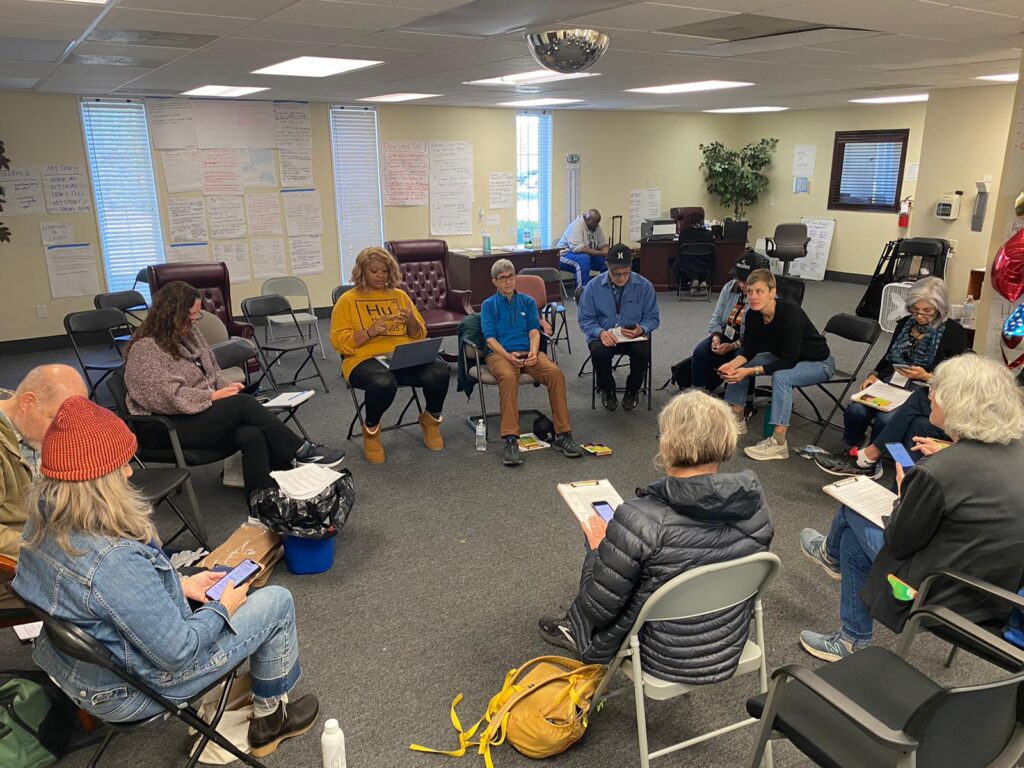
Seeing the one in the all
When I stepped up onto each front porch, I first took a deep breath, calmed my body and mind and relaxed my arms. This allowed my clipboard to be held relaxingly to the side, not in front of me, so I could be open to whomever answered the door. I thought about the person inside the house and what action I would be taking them away from. I reminded myself that listening to someone and providing them with needed factual information beyond the everyday misinformation coming out of the media was a gift I was offering. Then I rang the bell.
What I encountered at each door was wildly varied. Sometimes I was greeted by angry dogs, sometimes I saw someone peek out the shades and then go hide. Other times someone would yell out and I would need to yell back that I am Annie, with Michigan United and we are talking to neighbors about the election. That might elicit the door opening or something less kind.
Breathing and smiling, I faced my new friend with my most important goal of providing them deep empathy for whatever they were feeling about the election. This was true no matter what candidate they were learning toward supporting. Through our practice we have learned that everyone wants happiness and safety for themselves and their loved ones and no one wants suffering. Listening from that place allowed me to really connect with people wherever they were.
I could empathize with people feeling worried about the price of food or the ones who had multiple jobs and were worried about the economy getting even worse. I, too, want to be able to support my family. I could understand those who were afraid to take a yard sign because the neighbors don’t support the same candidate. I, too, want harmony in my community. I could even empathize with folks who were worried about the failing strength of their unions, not because I am a union worker, but because I saw the strength of unions growing up in Michigan and how they gave working people the power to hold corporations accountable and allowed them to make a living wage with benefits. And because I want everyone to be able to have a living wage and fair benefits.
When I asked voters how they were feeling about the election, I heard many different answers, “I can’t wait for it to be over!”, “I am tired of them pointing fingers at each other”, etc. People were struggling with so many things, including a sense of separation and fear. Many people started off annoyed or aggressive with me, and by the end we were talking like old friends. We all want to love and be loved, to understand and be understood – we truly inter-are with everyone.
I met one woman who was pulling into her driveway and – there I was – a stranger standing on her porch. She was not happy to see me. I continued to breathe and smile and offer her empathy. She opened slowly like a flower and shared with me that she had recently lost her 20 year old godson in a car-jacking by a 16-year old boy. She was exhausted with the grief and with sitting in a courtroom. She assumed that I wouldn’t care about her suffering and would just want her to vote a certain way. She was very pleased to let me listen to her pain with an open heart. She hadn’t had time to learn about the election so was open to my sharing a bit about the candidates.
Another man, about my age, yelled through the door over the sound of his aggressive dogs, to say he didn’t want to talk and he definitely wasn’t voting. He couldn’t hear me well, so he came out on the porch to tell me to go away, and we ended up talking for 20 minutes. After hearing him out, I asked if he wanted information about how to register to vote. He admitted that he was registered but just didn’t want to vote. Turns out that his wife was voting for the candidate I was supporting. And maybe, just maybe, he said, he would let her take his hand and bring him to the polls too. I really enjoyed my conversation with this kind and funny man.
What we all need to heal
Deep listening, empathy, and connection is exactly what we all need to heal the divisions that we have been feeling, especially here in the U.S. We know from our practice that understanding is love’s other name. It’s much harder to find common ground when we only see and hear angry ads and biased news on TV and social media. When we are face to face with another human being, it’s easier to tap into our empathy and see them as just like us in so many human ways.
At the end of many of my conversations, I let voters know that in my heart what I really care most about is this ability to talk and connect with other people, like we were doing right then. To have civil discourse with people who may not agree on the way to our shared basic and universal needs for wellbeing, health, safety, and connection. I shared that I was worried that if we continue to move toward more and more separation, we all will lose.
Although my hopes for a particular election outcome weren’t realized through my time on the porches and at the doors in Michigan, my hope for us as humans and the ability to connect and care about each other greatly increased. My happiness depends on your happiness, no matter who you vote for and how you identify, and the only way to bridge those murky waters is to reach out and connect. I’m so glad I had this opportunity to practice mindful speaking and listening in Michigan and experience so many nourishing connections.


